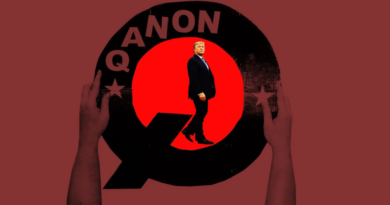The Pro-Trucker-Convoy Rally Is Another Failure for Far-Right Demonstrators in DC
A rally on the Washington Monument grounds Tuesday to support trucker convoys has drawn a minuscule crowd so far. About 20 people are in attendance, Washingtonian photographer Evy Mages reports from the scene, as well as a similar number of people who are there to cover the event.
The rally was organized by Kyle Sefcik, an MMA fighter and independent candidate for governor in Maryland. Sefcik was also the organizer of a convoy called Freedom Convoy USA 2022, which was due to arrive in DC Tuesday but fizzled out when only five trucks showed up in Las Vegas. His original permit application to the National Park Service anticipated a crowd of one to three thousand people; by the time the event received a permit Monday, that expectation had been revised to a maximum of 500 people. That number, as well, appears to have been wildly ambitious.
Several trucker convoys are still on their way to DC, with the intention of opposing vaccine and face-mask mandates in the spirit of the demonstrations that paralyzed Ottawa and the Ambassador Bridge between Michigan and Ontario earlier this year. Unfortunately for their messaging, such restrictions are falling away in many US locales. In DC, the city’s requirement of vaccination for dining expired last month, and its face-mask mandate ended Tuesday. Organizers have attempted to shift their message to a somewhat obscure argument about the President’s ability to declare a state of emergency, domestic extremism researcher Jared Holt told Washingtonian last week. If you look at some of the trucker convoy chats on Telegram, you’ll see a lot more discussion of conspiracy theories and QAnon references than constitutional arguments. Many people on those forums, Vice reports, have complained that the war in Ukraine has vacuumed up all their attention.
Holt was reluctant to laugh off the protests despite their organizational woes: The truckers and their supporters, he said, intend to “be as disruptive as they can” if and when they get to DC. Authorities, stung by their ill preparation on January 6, 2021, weren’t taking any chances, either. Fencing went back up around the US Capitol, where President Joe Biden is scheduled to deliver his first State of the Union address Tuesday evening, and the US Department of Defense has approved the deployment of up to 700 unarmed National Guard troops to aid police forces in DC with traffic control.
Sefcik’s underwhelming rally is a reminder of several local demonstrations that didn’t quite go to plan recently. Both were organized by a minor Trumpworld figure, Matt Braynard. His rally last September to support people accused of crimes on January 6, 2021, drew far more police and members of the press than actual attendees. Braynard repeated this feat with even fewer participants this January on the anniversary of the Capitol riot, drawing about a dozen people and five or six times as many journalists to a demonstration outside the DC Jail, where about 40 people accused of crimes on the 6th are held.


“Honestly, this is mission accomplished,” Braynard said that evening about the piddly attendance, noting the press coverage he’d earned. Much of the media professionals at these rallies appeared to represent outlets based outside the US, but even domestic outlets face the same conundrum regarding these events that local law enforcement does: how seriously to take them after January 6, 2021. MAGA voices had touted the idea of invading the Capitol before former President Trump encouraged them to march down Pennsylvania Avenue to Congress, which was scheduled to certify Joe Biden’s victory over Trump that day. Still, very few in law enforcement foresaw the at-times medieval fighting that would ensue as several thousand people invaded the Capitol.
Indeed, in a city that has seen increasingly organized incursions by far-right people going back to “Pizzagate,” there’s little choice but to take treat these events as possible threats to everyday life until they prove otherwise. Today’s rally may have been a bust, but who knows what will happen next?


